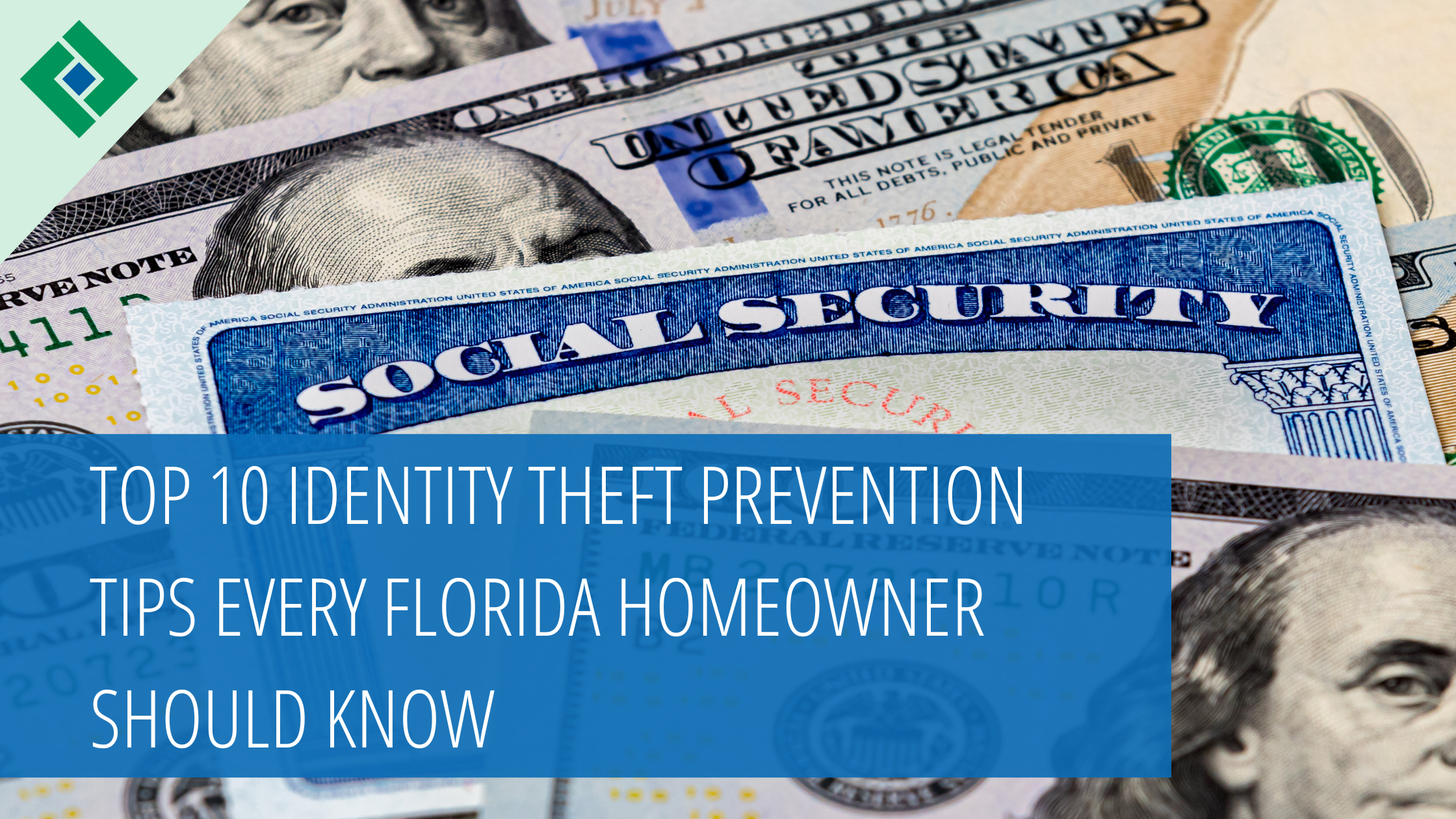Top 10 Identity Theft Prevention Tips Every Florida Homeowner Should Know

Identity theft is one of the fastest-growing crimes in Florida, and it can happen to anyone.
In Florida, reports of identity theft remain among the highest in the nation, fueled by a mix of large-scale data breaches, online scams, and even old-fashioned mailbox theft. Protecting yourself takes more than luck. It takes knowledge, vigilance, and a few smart safeguards.
Here are 10 essential identity theft prevention tips every Florida homeowner should follow.
1. Create Strong, Unique Passwords
One of the simplest yet most effective identity theft prevention tips is to use strong, unique passwords for each account. Avoid reusing the same login across multiple platforms. A password manager can help you keep them secure without having to memorize them all. And remember: Many breaches in Florida begin with stolen or reused login credentials.
2. Turn on Two-Factor Authentication
Most financial institutions and email providers now offer two-factor authentication (2FA). This extra step – a code sent to your phone – can stop criminals in their tracks, even if they already have your password. It’s one of the easiest identity theft prevention tips to implement today.
3. Guard Your Personal Documents
Shred documents containing personal information before disposing of them. This includes bank statements, medical bills, and any paperwork containing personal details. In many Florida communities, unlocked curbside mailboxes are common targets. A locking mailbox or a P.O. box can add an extra layer of protection.
4. Be Cautious on Public Wi-Fi
Logging into your bank account from an airport or coffee shop may feel convenient, but open networks make your data vulnerable. Save sensitive logins for secure networks at home and consider a virtual private network (VPN) when traveling.
5. Monitor Your Financial Accounts & Credit Reports
Regularly review credit card and bank statements. By keeping an eye on what's being spent, you can catch any fraudulent behavior as it occurs. Look for small "test charges" often signaling the beginning of theft. Should anything appear incorrect, contact your financial institution immediately.
All U.S. residents are entitled to one free credit report per year from each of the three major credit bureaus at www.annualcreditreport.com. Florida homeowners should take advantage of this resource, especially during storm season when scams often spike.
6. Watch for Phishing Scams
Phishing remains one of the top ways thieves steal information. Scammers often use email and text messages to trick you into giving up personal information. If you get a message from a number you don’t know, delete it without replying. Emails can be harder to discern, but the sender’s address is often a giveaway. Never click attachments or links you aren’t expecting unless you can verify the source. After hurricanes, phishing scams in Florida often involve criminals posing as FEMA, contractors, or even insurers – so be extra vigilant during storm season.
7. Protect Your Devices
Keep phones, tablets, and computers updated with the latest security patches. Install antivirus software and enable automatic updates. A weak device can be an open door for identity thieves. Secure your home Wi-Fi with a strong password and avoid leaving devices unattended in public places.
8. Limit What You Share Online
It may seem harmless to post birthdays, anniversaries, or school details, but thieves use these clues to guess passwords and security questions. Oversharing travel plans also advertises when your home may be empty. One of the simplest identity theft prevention tips is to pause before posting personal milestones or locations publicly.
9. Secure Your Mail and Packages
Identity thieves often steal personal details straight from mailboxes or unattended deliveries. Consider a lockable drop box or secure package locker if available in your neighborhood. Collect your mail daily. It’s one of the simplest identity theft prevention tips you can practice.
10. Add an Extra Layer of Protection With Identity Theft Insurance
Even with your best efforts, no one is immune from identity theft. Data breaches at retailers, medical offices, and government agencies mean your information may be exposed through no fault of your own. It’s why Florida Peninsula Insurance Company offers affordable identity theft insurance as an optional add-on to your homeowners policy.
This identity theft coverage gives you access to:
- A consumer fraud specialist to work directly with creditors.
- Thorough damage assessment and a recovery plan.
- Up to $25,000 in reimbursed expenses such as attorney fees or lost wages.
- Assistance with credit monitoring and repair until your record is restored to its pre-fraud condition.
Think of this insurance as a safety net. Even if one of your identity theft prevention tips slips or a breach happens elsewhere, you’ll have the help you need to reclaim your good name quickly. And at a cost far less than the time and money you would spend repairing fraud on your own.
Florida Homeowners: Identity Theft Vigilance Pays Off
Florida ranks near the top nationwide for reported identity theft cases. Why? A large retiree population, heavy tourism, and disruptions from hurricanes all create myriad opportunities for scammers. Following these identity theft prevention tips makes you more difficult to target. And adding identity theft insurance ensures you’re never alone if fraud strikes. After all, keeping your family and home safe means protecting more than your walls and roof. It means protecting your identity as well.
Talk to your agent today about adding identity theft insurance to your homeowners policy.
Not yet insured by Florida Peninsula Insurance Company? Get your quote now.

